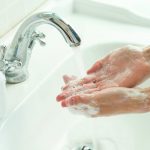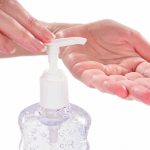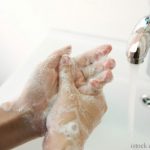FoodSafety.gov is offering advice about hand washing, now that the holidays are over and cold and flu season is here. Proper hand washing is the most effective way to reduce infection and illness, especially foodborne illness. People often touch their ears, eyes, and noses without even realizing they are doing it. Your hands should be washed before eating food, before, during, and after preparing food, before and after treating a cut or wound, and before and after caring for someone who is sick. Always wash your hands with soap and water after handling uncooked eggs or raw meat, poultry, and seafood. The correct way to wash your hands is to use warm water, lots of soap, and lather for 20 seconds. Be sure to scrub the backs of your hands, between the fingers, and under the … [Read more...]
Today is Global Handwashing Day
Today is the 8th annual Global Handwashing Day. This day is to help increase awareness and understanding of hand washing as a way to prevent disease, especially foodborne illness, around the world. In fact, researchers estimate that if everyone around the world routinely washed their hands, a million deaths could be prevented every year. The CDC reports that although people around the world clean their hands with water, very few use soap to wash their hands. Soap and water available for hand washing may be less available in developing countries, and even when soap is available, it is often reserved for bathing and laundry instead. Washing hands with soap removes bacteria much more effectively than washing with plain water. About 1.8 million children younger than the age of 5 die … [Read more...]
Less Than Half of Consumers Wash Hands After Handling Eggs
A new study published in the Journal of Food Protection has found that only 48% of consumers wash their hands after handling raw eggs. Eggs can be contaminated with Salmonella bacteria, and that food-pathogen combination sickens thousands of Americans every year. Researchers were from RTI International, Tennessee State University, and Kansas State University. The study was partially funded by the Department of Agriculture's National Institute of Food and Agriculture. A 2013 web survey of 1,504 adult grocery shoppers was conducted. Based on self-reported data, most consumers store eggs in the fridge, as recommended, for no more than 3 to 5 weeks, as recommended.But after cracking eggs, 48.1% of respondents washed their hands with soap and water. And more than half of respondents … [Read more...]
Wash Your Hands to Prevent Foodborne Illness!
Most food poisoning cases happen in the home. Why? Research from Kansas State University finds that 90% of home chefs violate food safety rules, especially rules about hand washing and cross-contamination. Cross-contamiantion happens when hands are not washed after handling raw meats, when cutting boards and utensils are used for fresh foods after coming into contact with raw meats, and when preparing food. The study was conducted to discover which type of food safety education resulted in the best food safety practices. One hundred twenty three participants were divided into three groups. The first group was told about the food safety campaign messages of "clean, separate, cook, and chill." The second group looked at pubic service announcements on this message, and the third did not … [Read more...]
Celebrate World Handwashing Day By Singing Happy Birthday, Twice
Today is World Handwashing Day and one of the best ways to celebrate is to wash your hands with soap and running water for as long as it takes you to sing Happy Birthday, twice. Global Handwashing Day was originally created for school-age children but has expanded to include teaching everyone about one of the best ways to prevent the spread of disease. "Turning handwashing with soap before eating and after using the toilet into an ingrained habit could save more lives than any single vaccine or medical intervention, cutting deaths from diarrhea by almost half and deaths from acute respiratory infections by one-quarter," according to the Global Public-Private Partnership for Handwashing (GPPPH). Handwashing with soap and water is the most effective and inexpensive way to prevent … [Read more...]
Proper Hand Washing for Kids and Teens
One of the most important tools in the fight against food poisoning is hand washing. Unfortunately, even adults are sometimes lax when it comes to washing hands properly. Kids, who are more susceptible to food borne illness, may need special lessons and prompting about this crucial hygiene issue. Always wash your hands after going to the bathroom, before preparing and serving food, while you are preparing food (especially after handling raw meats and eggs), before eating, and after playing with pets or taking out the trash. It's also important to tell kids to wash their hands frequently when they're sick, especially after they cough or sneeze. To properly wash hands, wet them under warm running water. Add some soap and scrub for at least 20 seconds. To time this, since "Happy … [Read more...]
In Norovirus Season, Remember Food Safety Begins With Clean Hands
During cold, flu and norovirus season it's important to remember that clean hands are essential when handling or preparing food. The University of Minnesota Extension Service (UMES) has these tips for hand washing for food preparation. These steps are important any time of the year, since clean hands can help prevent outbreaks from everything from hepatitis A to Salmonella and E. coli. Before you prepare or handle food, wash your hands in this way: wet your hands with warm running water, soap them, then, rub your palms and the back of your hands for at least twenty seconds, UMES recommends. "Do not forget your nails and the areas between your fingers. If you use hands to mix food, first wash them with a brush and get under your fingernails." When rinsing the soap from your hands, … [Read more...]
FDA Goes Sour on Antibacterial Soaps
The FDA is taking a closer look at antibacterial soaps. Their issue is with ingredients called triclosan and triclocarbon, chemicals that may act as hormone disruptors. And those ingredients don't have any proven health benefit; they don't kill any more bacteria than plain old soap and water. There is no evidence that over the counter antibacterial soaps are more effective at preventing illness than ordinary soap and water. Dr. Colleen Rogers, a lead microbiologist at the FDA said, "new data suggests that the risks associated with long-term, daily use of antibacterial soaps may outweigh the benefits." The soaps may also contribute to the serious problem of antibiotic resistance. The government issued a proposed rule on December 13, 2013 that would require manufacturers to provide … [Read more...]
Handwashing Awareness Week Tip: Don’t Touch Your T Zone
Handwashing Awareness Week Ends tomorrow, but good handwashing practices shouldn't. Washing your hands is the best defense against illness and especially important during the winter months which are peak flu and norovirus seasons. Dr. Will Sawyer, a solo family practice doctor, has created the Henry the Hand Foundation to raise awareness about the importance of good handwashing practices as a way to prevent infection. According to Sawyer, "there are four elements of "hand awareness" that can prevent illness: washing your hands before you eat, not coughing into your hand, not sneezing into your hands, and refraining from touching the mucous membranes of your eyes, ears, nose and mouth. Wash you hands with warm water and soap fro 20 seconds, about as long as it takes to sing Happy … [Read more...]
Today is Global Handwashing Day
Today is Global Handwashing Day! One of the best ways to prevent foodborne illness and other diseases is to thoroughly wash your hands frequently. And correctly. Many people do not wash their hands correctly, which increases your odds for catching the flu, a cold, or a bacterial infection. In fact, 50% of flu cases and 60% of gastrointestinal illnesses in schools are spread by dirty hands. Hand washing with soap and water is more effective at removing bacteria and viruses than antibacterial liquid. Human feces are the main source of pathogens that cause diarrhea. One gram of human feces can hold 10 million viruses and one million bacteria. Using the toilet, changing a child's diaper, or cleaning the bathroom can deposit fecal materials onto your hands. Studies have shown that children … [Read more...]









